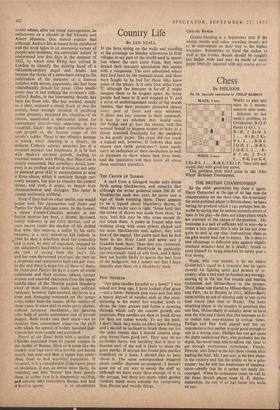Chess
BY PHILIDOR
No. 16. Specially contributed by PHILIP BARRON BLACK, 4 nicu.
WHITE to play and mate in 2 moves: solution next week.
Solution to last week's problem by Gooderson: B-Q 4! threat Q-Q 7. I ... R x13; 2 Kt-B 3.
1 ... Axil; 2 Kt- B 4. 1 B-B 4;
2 Q-B. 1 ... B-B 3;
2 Q-K 5. 1 R-- B 5 ch; 2 Px 3.
1 P-K 3 or K 4; 2 Kt-B 6. 1 R-R 6; 2 Kt x P. Very rich and varied play with good key move.
This problem took third prize in the 'Akin White' Birthday Tournament.
THE BRITISH CHAMPIONSHIP
So the older generation has done it again. Harry Golombek at the age of 44 has won the championship for the third time. He is certainly the most polished player in British chess; he has a feeling for position which I can perhaps best de- scribe by saying that he seldom commits errors of taste in his play—he does not adopt plans which are contrary to the nature of the position. His weakness is a lack of sufficient will to win—he is rather a lazy player; this is why he has not done quite so well in top class international chess as his gifts would lead one to expect. He is seen to best advantage in defensive play against slightly unsound attacks—here he is deadly; forced to exert himself by being attacked he rarely puts a foot wrong.
Wade, who was second, is by no means Golombek's equal as a strategist but he again showed his fighting spirit and powers of re- covery; after a bad start he finished very strongly, scoring 4} in the last five rounds and beating Golombek and Milner-Harry in the process. Third place was shared by Milner-Barry, Phillips and Parr. As at Buxton in 1951, Milner-Barry came within an ace of winning only to lose in the final round (this time to Wade). The finest attacking player in the country in positions that suit him, Milner-Barry is unlucky never to have won the title and I think that this keenness to do so makes him over-anxious at critical times. Phillips and Parr both played well but my impression is that neither is quite good enough to win in a strong year; Phillips has not got quite the depth needed and Parr, who probably has the depth, has never been able to afford the time to get enough tournament experience. Finally, Penrose, who failed in the last three rounds after leading the field. He, I am sure, is the best player in the country and has the ability to be a great master; but he still has weaknesses of tempera- ment—chiefly that he is rather too easily dis- couraged. When he overcomes these, he will be the finest British player since H. E. Atkins; meanwhile, the rest of us had better win while we can.
WHITE, 8 wen.
































 Previous page
Previous page